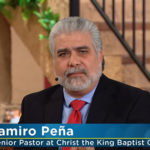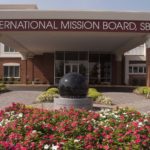PORVOO, Finland (ABP) — A former Rwandan Baptist pastor accused of genocide in the African country's 1994 massacres is standing trial in Finland.
Francois Bazaramba, 58, is accused of planning, leading and carrying out killings of 5,000 members of the Tutsi ethnic group in the municipality of Nyakizu in April and May of 1994. His trial — Finland's first for genocide — began Sept. 1 and is expected to last several months. If convicted he could receive life in prison, which in Finland means a minimum 12 years in jail.
Bazaramba, who sought asylum in Finland in 2003, has been in detention since 2007. Finnish authorities refused to extradite him to Rwanda, fearing he would not receive a fair trial and because Rwanda has the death penalty.
The former pastor who led a youth center at Maranba Baptist Church claims he is innocent. His lawyer says Bazaramba was not in a position to have carried out the killings and claimed to have evidence that witnesses in Rwanda were tortured. Family and church friends in Finland disbelieve the charges, describing him as a good man who helped other refugees fleeing Rwanda's civil war.
The outcome of Bazaramba's trial, which is before four judges and no jury, will depend largely on the believability of eyewitnesses.
Matias Hellman, a liaison official of the International Criminal Court for the Former Yugoslavia, told Helsingin Sanomat, Finland's leading newspaper, that genocide cases are always difficult.
Hellman said the eyewitness testimony of surviving victims is extremely important in genocide trials but that statements by victims are not always reliable. Memories get distorted over the years, traumas change mental images and there are cases in which people have made up false accusations of war crimes. Still, Hellman said, eyewitness testimony carries weight, especially if backed up by hard evidence like written documents, video material and crime-scene investigations.
The charges against Bazaramba were brought by the International Criminal Tribunal for Rwanda, a court based in Tanzania formed in 1997 to try the masterminds of the massacres. The allegations stem largely from a report on the Rwanda genocide by the Human Rights Watch organization in 1999. Bazaramba's name was not on a 1999 list of genocide suspects, but his name was number 19 on a list of 93 Rwandans living abroad published by the government of Rwanda in 2006.
Rwanda claims that Bazaramba worked alongside Nyakizu's ruthless mayor, Ladislas Ntaganzwa, a hard-line ethnic Hutu wanted for genocide, to secure weapons and lead patrols hunting down Tutsis. The murders in Nyakizu came during a 10-day killing spree following the presumed assassination of Rwandan President Juvenal Habyarimana on April 6, 1994. Authorities say more than 20,000 people were killed in the Nakizu area. Hutus slew Tutsis across Rwanda during the period, with anti-Tutsi sentiment inflamed by Hutu government officials and official broadcasts blaming Tutsis for the president's death.
Eyewitnesses told Helsingin Sanomat in 2007 that Bazaramba acquired weapons and led killers. One witness told the newspaper that he got weapons from Eleazar Ziherembere, at the time general secretary of the Union of Baptist Churches of Rwanda. Ziherembere fled Rwanda in 1994 and now works as area director for Africa at International Ministries of the American Baptist Churches USA.
Sign up for our weekly edition and get all our headlines in your inbox on Thursdays
Ziherembere told the newspaper in 2007 that the Human Rights Watch report's claim that Bazaramba was a good friend of Ntaganzwa is not true, because he was a close friend of the previous mayor, whom Ntaganzwa deposed violently.
Ziherembere said he did not believe Bazaramba had the kind of political clout in the village to acquire and distribute weapons. The report says some of the crimes occurred at a bar owned by Bazaramba. Ziherembere said to his knowledge Bazaramba has never owned a bar.
"I have asked him later how much of what was written in the HRW [Human Rights Watch] report had he done," the newspaper quoted Ziherembere as saying. "He said that he did not take part in it. If he is guilty, let him be punished, but if he is innocent, let that come out."
Ziherembere declined additional comment about Bazaramba's trial, because "they have brought me into this mud."
"I prefer to be quiet, and I am glad the law of this land affords me to choose," Ziherembere said in an e-mail.
About 800,000 minority Tutsis and moderate Hutus died in the Rwanda genocide. While the hostility had tribal roots, some observers say those distinctions had largely disappeared until the colonial period, when Belgian missionaries noticed the Tutsis were taller and had more angular, European-looking noses, and introduced a system of ethnic identity favoring the minority group.
Both groups lived in totally integrated communities, until a propaganda campaign incited local citizens to root the Tutsis out as part of their civic duty.
Churches were not immune from the tensions. Prior to 1994 Rwanda was regarded one of the most Christianized nations in Africa. Ninety percent of its citizens claimed to me Christians. Most were Catholics, but vibrant evangelical communities were there as well. Danish Baptist missionaries began Baptist work in Rwanda in 1928. The Baptist Union of Rwanda invited Southern Baptist missionaries to join them in 1977.
In a 2001 article in Missionalia, the journal of the South African Missiological Society, missiologist J.J. Kritzinger said that while most Hutu and Tutsi Christians fellowshipped warmly on the personal level, most accepted the prevailing wisdom that Hutus were not as capable as Tutsis to govern the country and thus divided themselves between "us" and "them." Churches did not challenge those stereotypes, Kritzinger said, until it was too late.
Dwight Jackson, a former Southern Baptist missionary to Rwanda's neighboring country Burundi, said in a 2007 interview that he knew of no missionaries or teachers who tried to exploit or offer theological support for the superiority of one tribal group over the other.
"It was more a part of the cultural fabric that we were unable to address," said Jackson, now Africa and Burundi director for a Christian relief-and-development organization called Food for the Hungry. "So we did nothing."
-30-
Bob Allen is senior writer for Associated Baptist Press.














We seek to connect God’s story and God’s people around the world. To learn more about God’s story, click here.
Send comments and feedback to Eric Black, our editor. For comments to be published, please specify “letter to the editor.” Maximum length for publication is 300 words.